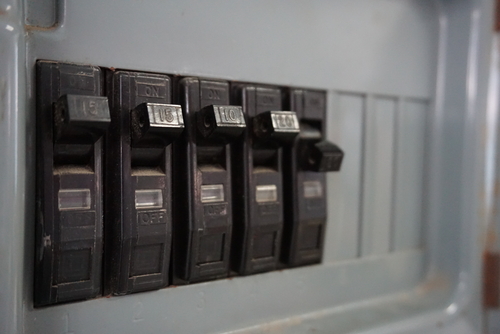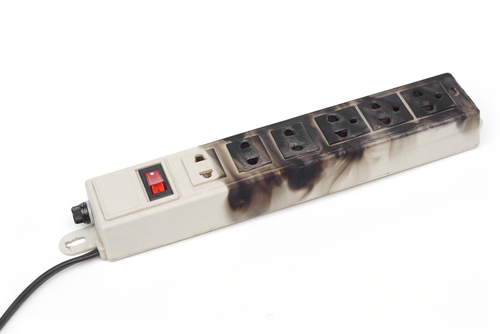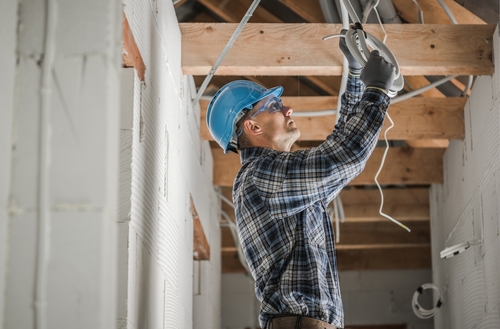August 9, 2023
How Extreme Heat Can Affect Your Electricity
Extreme heat seems to be the new norm across much of the country and in our neck of the woods. When looking at the longest streaks of 100 degree days in Denver, over half of the top 20 have occurred in the past 25 years. As a homeowner, it’s crucial to be aware of how this heat can affect different aspects of your home.
You know that running your air conditioning more spikes your utility bill, but how is the extreme heat impacting your home’s electrical system? We’ll cover some of the ways heat and electricity don’t mix well and offer tips on how to keep your home’s electrical safe during extreme heat.
How Does Heat Affect Electricity?
Just as your body has to work harder during hot spells, your electronics have to work harder too. When you go for a jog at high noon in July, you probably run slower than you would if you ran at 8:00 in the evening. Similarly, the electrons that create electricity move slower as the temperature rises. This leads to less efficient electrical systems that have to work harder.
One result of this is that transmission wire capacity goes down – meaning the lines that bring electricity to your home and the wires inside your home work harder to supply the power you need. You might even notice your lights dimming as powerlines struggle to transmit enough electricity to keep your home powered. Unfortunately, this often coincides with the need for more power as you’re running your air conditioner and fans along with other appliances.
Can Hot Weather Cause a Circuit Breaker to Trip?

Homeowners often see a correlation between hotter weather and tripped circuits. There could be several explanations for this:
- Your home’s electrical panel works harder to keep all your appliances running at the same time.
- Increased draw causes overvoltage in your power supply.
- Your electronic devices overheat and cause a surge.
- The heat causes the bimetallic strips in your circuit breakers to trip just as they would when too much power overheats them.
Your circuit breakers protect you from dangerous electrical hazards and potential fire. If the circuits in your home trip more in the summer, it may be time to have your system inspected and upgraded so that you safely get the power you need without risk to your family.
10 Tips to Keep Your Home Electrical Safe During Extreme Heat
If it feels like your home is struggling to keep up when the days are scorching, try following some of these tips:
1. Turn Off Appliances You’re Not Using
As the power grid struggles to meet everyone’s needs, turn off the items you’re not using. Whether it’s lights, fans or the TV, you’ll save yourself and everyone else a little more power.
2. Bump Up Your Thermostat
Raising your thermostat even a few degrees can save you stress on your air conditioner and money on your electrical bill. Use a programmable thermostat to keep your home warmer while you’re away and to cool it off before you get home.

3. Limit Extension Cords and Outlet Strips
Too many items plugged into a single circuit can overload it. Be careful with what you plug in and never combine multiple extension cords or outlets strips. They could turn into a fire hazard.
4. Cover Windows During the Day
Sunlight streaming through your windows can be lovely but it can also heat your home even more. During hot, sunny days, keep the curtains drawn and give your AC a break.
5. Switch to LED Light Bulbs
Incandescent light bulbs draw more power and run hotter than their LED counterparts. LED bulbs will last longer, use less power and help keep your home’s electrical cooler.
6. Limit Appliance Use
During periods of extreme heat, try to limit the use of high-energy appliances to essential times and make use of energy-saving modes, if available. This can help to reduce the overall load on your electrical system. Do laundry at night and consider line drying vs using your electric dryer.
7. Maintain Ventilation
Keep your electrical appliances, especially larger ones like refrigerators and air conditioners, in well-ventilated areas to prevent them from overheating.
8. Install Surge Protection
Use surge protectors for sensitive appliances. Consider investing in a whole-house surge protection system to protect your electrical devices from sudden voltage spikes that can occur during power outages or when the power comes back on.

9. Upgrade Your Wiring
Make sure your home’s wiring is up to code and can handle the power requirements of all your devices, particularly power-hungry ones like air conditioners. Old, worn-out, or inadequate wiring can pose a significant safety risk.
10. Have Your Home Inspected
A licensed electrician can identify damaged wires, loose connections, and other safety hazards. If your home isn’t getting enough power to keep your appliances running, your electrician can upgrade your electric panel to accommodate your needs or anticipate changes like a home electronic vehicle charging station.
How Heat Affects Electric Cars
Your home isn’t the only electrical system affected by rising summer temperatures. Electric vehicles can suffer as well. Extreme heat can significantly influence the performance and lifespan of electric cars.
Electric vehicle (EV) batteries are highly sensitive to temperature fluctuations. In high temperatures, the battery’s chemical reactions can accelerate, which may lead to a quicker loss of capacity and a reduced overall battery life. Moreover, like traditional vehicles, electric cars use cooling systems to maintain the engine and battery temperatures. During hot weather, the cooling system works overtime, consuming more power from the battery and potentially reducing the range of the vehicle.
In addition to battery and range concerns, the efficiency of other electrical components in the EV, such as the air conditioning system, can be affected by extreme heat. As a result, there’s an increased demand on the car’s electrical system, leading to a faster depletion of battery charge. Make sure that your EV is fully charged when you head out in the morning so that you can get where you need to go and get back home.
Keep Your Electricity Working All Summer
Don’t let the heat throw your power out of whack. Call in the licensed electricians at Applewood. We can upgrade your wiring, increase your power capacity and improve the safety in your home to keep the electricity safely flowing in your home all year long. Schedule your service call online today.


